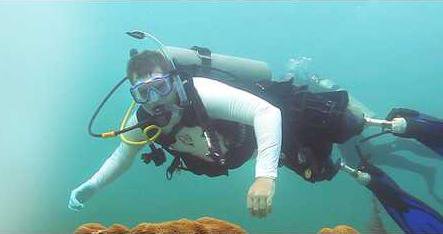KEY WEST, Fla. — Scott Schroeder had just finished a dive at the Western Sambo Ecological Reserve off Key West, but before climbing onto the boat, the U.S. Army man of 24 years — 20 of them with the elite Special Forces — needed help. "Could somebody get my leg?" he asked. About 25 feet below, resting on the ocean’s bottom, was one of his sea prostheses, with a flipper attached. His other artificial sea leg was dangling from what remains of his right thigh. Schroeder, 45, was laughing about his dilemma. A positive attitude goes a long way in recovering from injuries as grave as the ones he suffered just seven months ago in Afghanistan when the modified Humvee he was riding in ran over a roadside bomb. Schroeder’s world changed in that instant. So did his family’s. "Yes, I was injured," the chief warrant officer said. "But the whole family was really injured, too. I was willing to accept the risk and the sacrifices. They didn’t choose it." Healing as a family is why Schroeder, his wife of 23 years, Laura, and their 16-year-old son, Zach, were in Key West this week, taking part in the Task Force Dagger Foundation’s recreational therapy program. Task Force Dagger was the code name for the Special Operations Unit formed shortly after 9/11 and charged with bringing down the Taliban regime and denying sanctuary to al Qaida, said Keith David, volunteer managing director of the Texas-based nonprofit, which was established in 2009. In just two years, the foundation has helped 112 wounded Special Operations soldiers and their families on a shoestring budget of $95,000. "I think the Special Operations soldier is a lot of time very focused, very driven, almost always a Type A person," David said. "When they fall down, they keep getting up, and they don’t give up." That is the case of the 10 wounded warriors, who along with 15 family members were in the Keys learning or relearning to dive with lost limbs and other injuries as therapy for body and soul. "They don’t want pity; they are professional soldiers," said David, a member of the U.S. Army Special Forces for 15 years. "They just are trying to learn a new skill." Schroeder remembers losing one leg in the explosion and about 20 minutes later being carried onto a helicopter. He woke up days later at Walter Reed Army Medical Center in Washington, his wife at his side. He soon learned he also had lost his other leg above the knee and that his right arm was so damaged it might require amputation. The family diving trip to the Keys became a highlighted date on the calendar. "When your whole life revolves around the hospital, something like this trip can become a milestone you mentally focus on," said Laura Schroeder, who left her job as a landscaping architect in Clarksville, Tenn., to be at her husband’s side as he recovered in Bethesda, Md. But Tuesday was a good day for the whole family, even if Scott’s sea legs didn’t stay on underwater. Laura and Zach practiced dive skills with their instructor before exploring the patch reef. Soon, dad and son were looking under coral together at lionfish. There would be no shark sightings on this dive, but the family went on several more before returning to Maryland, where Scott will resume his rehabilitation. When he shows proficiency with the artificial legs he has now, he will be fitted for ones that have movable knees for more mobility. He hopes to get close to his old height of 6 feet. "They say the technology has come a long way," Schroeder said. "But to me, they still seem archaic." Now that he has been able to conquer the sea without legs, Schroeder said his next quest is to skydive again. He jumped from a whopping 27,000 feet while on infiltration missions. "The Army has been a great life," Schroeder said. "I stayed in way past retirement because I wanted to be on the team. That’s all I’ve known how to do. Now, especially with the injuries, I don’t know what I am going to do for a second career."
Wounded vets find diving in Keys therapeutic

